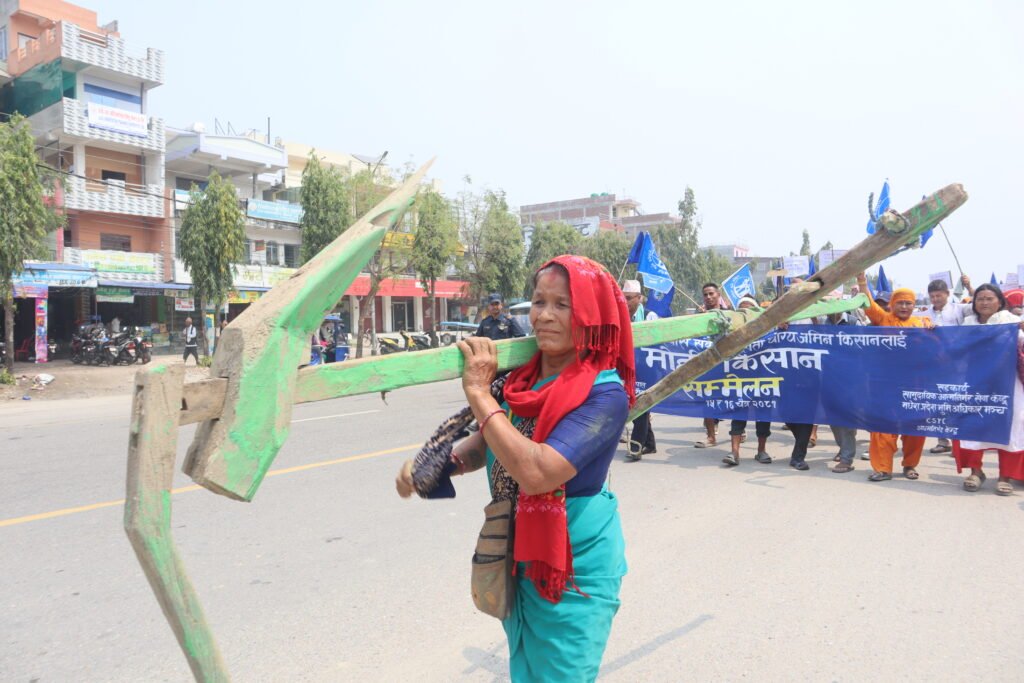A Tenant (Mohi) Farmers’ Conference was held in Chandrapur, Rautahat from 28th– 29th March 2025 by the National Land Rights Forum and the District Land Rights Forum, in collaboration with the Community Self Reliance Centre.
One of the major achievements of this program was that the Rautahat Declaration was prepared and issued based on discussions held during the conference and the concerns, demands, and positions expressed by the farmers. The declaration has been submitted to the Ministry of Land Management, Cooperatives, and Poverty Alleviation, as well as the Department of Land Management and Archives, and discussions have been held on the matter. The chief guest of the conference was Janardan Singh Kshetri, Minister of Land Management, Agriculture, and Cooperatives of Madhesh Province. The conference was attended by more than 1,500 tenant farmers and landless individuals from 12 districts, with an outstanding number of women participants.
Tenant farmers and landless individuals shared their experiences and struggles regarding land rights. CSRC’s Executive Director Jagat Deuja conducted a training session on the historical land and agricultural movements in Bara and Rautahat, the distribution of Mohi land, and land management policies for landless Sukumbasi, landless Dalits, and informal settlers.

The conference has revived tenant farmers and landless individuals, giving them renewed energy for the movement, hope for acquiring land, and encouragement to engage in the process. It has also clarified the efforts and procedures required by farmers and organizations to resolve the issues. The event began with a rally which commenced at Moonlight Boarding School in Chapur Bazaar, located on the East-West Highway in Chandrapur. It passed through Chandrapur Chowk, the Area Police Office, Durga Temple, the Internal Revenue Office, the District Survey Office, and the District Land Revenue Office, eventually concluding at the meeting hall of the Hatemalo Community Forest Users Group.
Participants chanted slogans such as ‘Implement tenant land distribution immediately,’
‘End dual ownership,’ ‘Beware, exploitative feudalists,’
‘Make the tenant conference successful,” and “Long live the National Land Rights Forum Nepal.’
NLRF General Secretary Foud Singh Syangba explained the movement and efforts being undertaken for securing land rights for tenant farmers and those deprived of land ownership, urging all levels of government and representatives to take special initiatives in resolving this issue. He shared that a Tenant Farmer Conference was organized in Rautahat to conduct detailed discussions on the problems and alternatives for tenant farmers and formulate a strategic action plan to resolve them.
Bhawani Ghimire, DLRF Chairperson Sarlahi shared, “Laws and regulations have been enacted, aiming to end dual ownership of land, but years have passed without tenant farmers receiving their legally established rights. They are still compelled to engage in movements to claim their entitlements. In their quest for justice, farmers have faced countless hardships. Even when courts rule in favor of the farmers, they endure physical assaults while cultivating the land.”
Parbati Thami, Treasurer, NLRF expressed, “Laws, rules, and regulations do not restrict the tenant farmer issue, yet the problem persists. The government must design concrete plans to address the issues of tenant farmers across the country. Administrative support from officials is essential. Women always lead from the front in efforts to work the land and fight for land rights. When dividing tenants and providing land to the landless, issuing joint land ownership certificates in the names of both husband and wife should be mandatory.”
DLRF Rautahat Chairperson Chandra Bahadur Thing stated that the problems faced by tenant farmers and the landless in Rautahat and across the country are highly complex and can only be resolved through collective efforts. Many representatives from nearby districts attended the event and expressed solidarity.
Madan Bishwokarma, Chairperson, LIRC Sarlahi committed to help from his position. Janardan Singh Kshetri, Chief Guest (Minister, Ministry of Land Management, Agriculture, and Cooperatives, Madhesh Province) committed, “I will immediately convene a review meeting with the land revenue chiefs of all districts in the province through my ministry to discuss tenant farmers’ issues. I will direct the swift implementation of the provision under Nepal’s law that grants tenant farmers half of the land. The distribution of land to tenants must be accelerated to resolve the matter.” Lyam Bahadur Darji, Chairperson of the National Land Rights Forum, Nepal expressed that the DLRFs and other concerned bodies must remain vigilant, actively support the process, and raise awareness. During the session, tenant farmers and landless individuals shared their stories of challenges and struggles. Some of them were betrayed by their own family members, such as one’s brother getting the land in his name, despite him not farming at all in the land. During the past years, the tenant farmers had led many movements. They had to face a lot of insults and violence from the landlords.
Kisunlal Sunar, a tenant farmer from Sindhuli has been cultivating land and holds a tenant rights certificate. Despite submitting an application for land distribution to the land revenue office two years ago, no decision has been made. During the period of displacement caused by the Maoist insurgency, he was unable to pay regular rent, and the landlords also did not seek rent. After returning to the village post-insurgency and resuming farming, landlords are demanding payment for the accumulated rent over many years. However, he is unable to pay such a large sum, which has hindered the land distribution process.
Puspalal Rajdhami, Itahari-1, Sunsari states, “We hold a tenant certificate for 1.20 ha of land in Hasandaha. The tenancy is registered jointly in the names of my grandfather, father, and grandmother, and their names are also listed in the tenant register. However, despite this, we have not been able to cultivate the land. Thirty years ago, the landlord forcibly evicted us from the land.” Tenant farmers, lacking ownership of land, considered cultivating land as sharecroppers to be relatively more respectable than being entirely landless. Landlords’ refusal to allow sharecropping signified the absence of trust or support, leading to perceptions of uncertainty and unreliability. Consequently, there was a competitive rush among farmers to cultivate others’ land. However, landlords would often replace tenant farmers to facilitate evictions and avoid long-term tenancy arrangements. During the rally, the farmers showcased various agricultural tools such as yokes, spades, hoes, baskets, and sickles.

Main Demands and Commitments from the Rautahat Declaration
The Key demands of the Rautahat Declaration include completing tenant land distribution within two years, ensuring tenant farmers receive half of the land as their rights, and providing joint ownership certificates for couples. Since 1996, the provision for securing tenant rights has been removed, leaving many cultivating farmers unregistered. It is proposed to coordinate with local authorities to maintain records of tenant farmers and ensure tenant rights for those who have continuously cultivated land since before 1996 and were excluded from the registration process.
Tenant farmers demand simplified process, tackling corruption, and leasing unused land for farming. Legally, tenant farmers should be provided with their rightful half of the land, and the remaining half, which is under the name of absentee landowners, should be made available for purchase by the farmers. Additionally, a system should be implemented to allow farmers to pay in installments. Tenant farmers who lack a certificate of tenancy rights but have other supporting documents are facing delays in land distribution due to restrictions from the land revenue office. It is proposed that such documents, along with recommendations from local authorities, be recognized as official proof to facilitate immediate land distribution. Emphasis is placed on social justice for marginalized groups, such as Dalits and informal settlers, ensuring their active participation in land distribution and management efforts.
Tenant farmers, the landless, and those deprived of land rights in Nepal are committed to raising awareness and mobilizing efforts for equitable land distribution and justice. They aim to resist exploitation, maximize agricultural productivity while preserving nature, and transition from tenant status to land ownership. Through coordinated actions and legal measures, they pledge to address rent-related disputes, simplify land distribution processes, and advocate for the rights of marginalized groups.
Written by: Sushma Neupane, Om Prakash Ram
Edited by: Knowledge Management & Communication Unit







